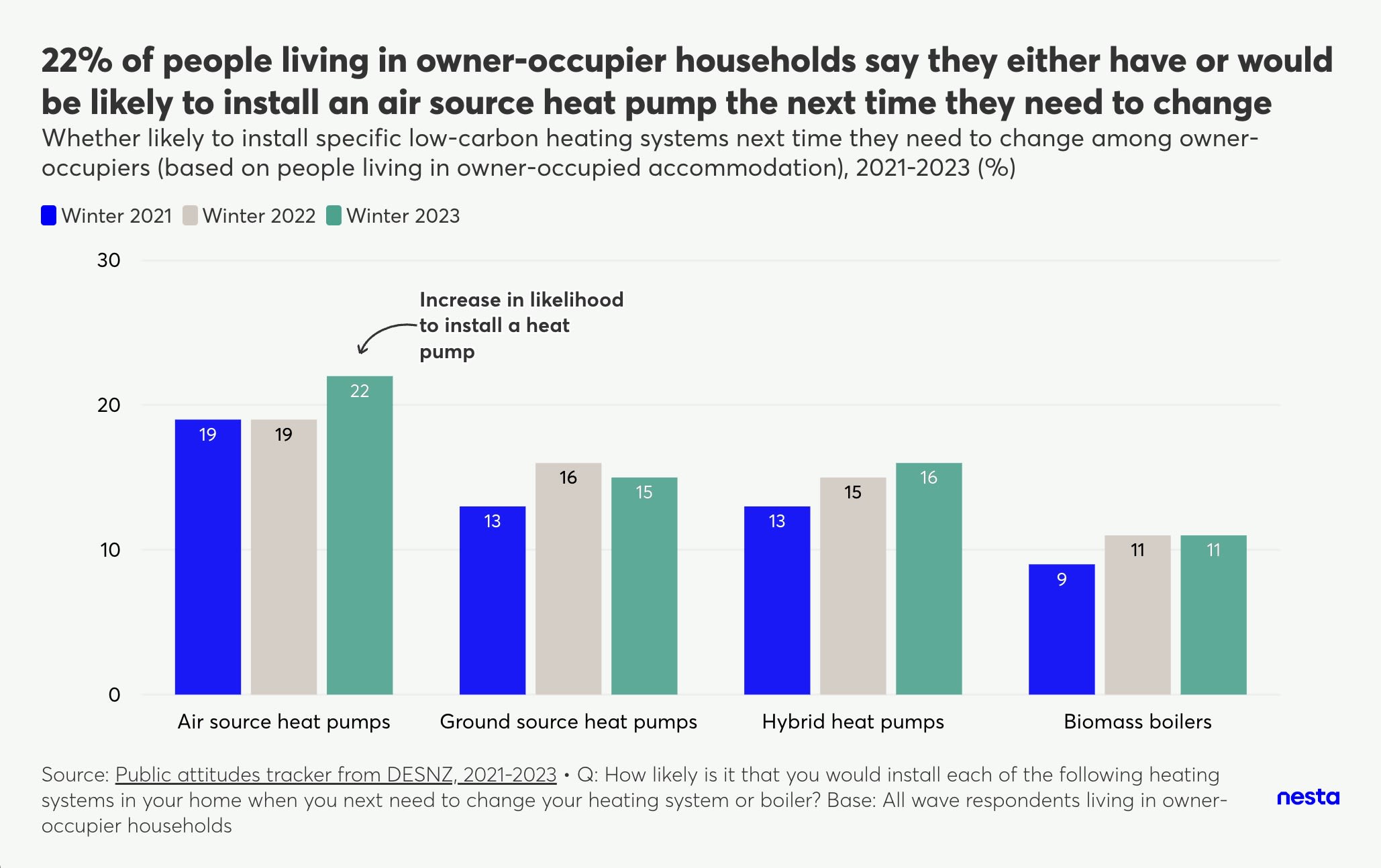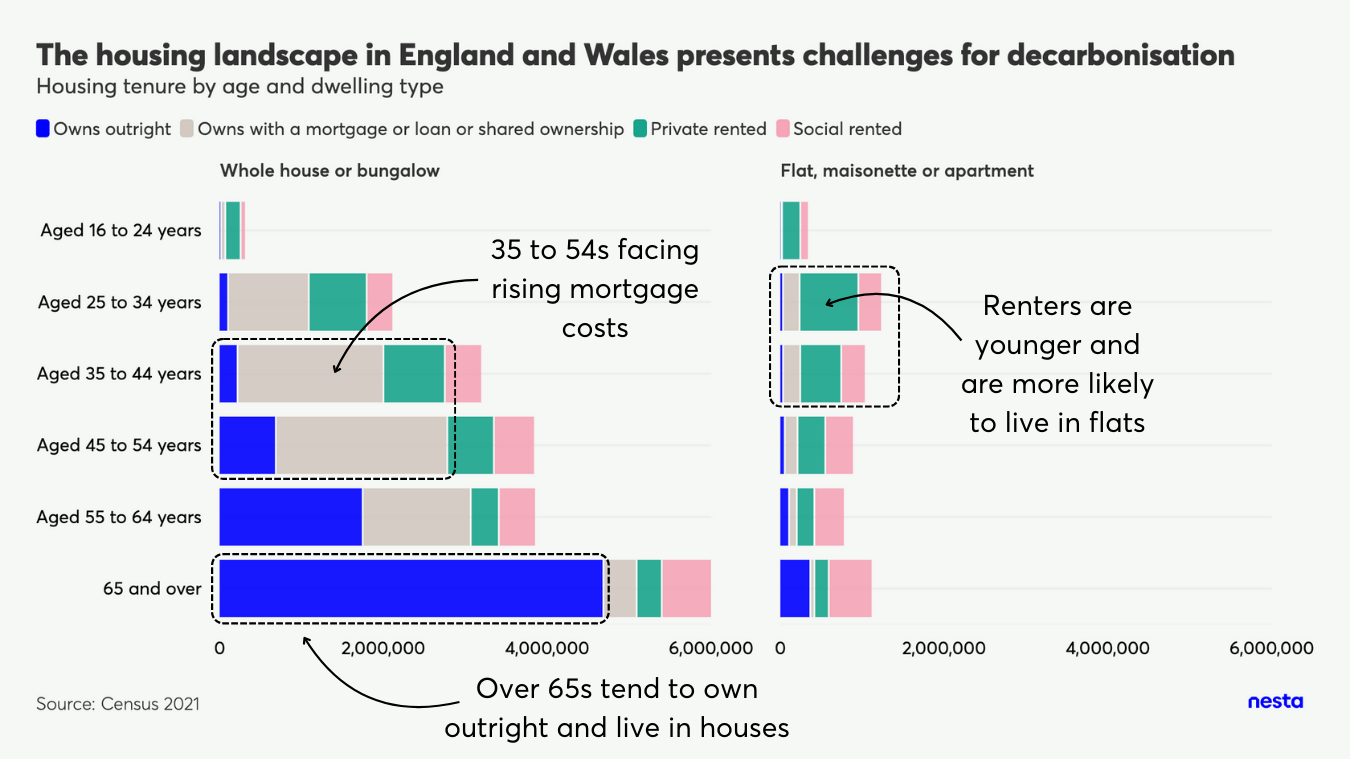Do the UK public know their EPCs as well as their ABCs?
Five findings on public views on green home heating from the Government’s Public Attitudes Tracker: Winter 2023 survey
Last week, we launched the 'Visit a heat pump' service. Part of the rationale is to close the knowledge gap about the technology by making it easy for people to visit a heat pump in their area and ask any questions they have.
In March the UK Government published its latest Public Attitudes Tracker survey – a treasure trove of data about the public’s awareness and understanding of climate change issues, green heating and low-carbon choices. Knowledge and information are barriers to heat pump adoption and this shows in the data.
There are many ways in which people need information and reassurance about technology for decarbonising homes. As part of this work, we delved into the most recent data on people's attitudes towards low-carbon heating and heat pumps specifically, for a temperature check on the public’s awareness of the transition to green heating and whether there are signs of change.
A glance across a variety of indicators shows that some attitudes have remained stagnant and low, while others have shown signs of improvement. What are the potential implications of these trends?
1. The only low-carbon heating system better known by the public now compared to the previous year are heat pumps
Three-quarters of people are aware of air source heat pumps – making them the low-carbon heating system with the highest level of overall awareness. This awareness is highest among older age groups and is especially high among those who say they know at least a fair amount about net zero.
The overall high level of awareness is a positive sign, but awareness isn’t the same as sentiment – it may be that more people are aware but don’t feel positively about heat pumps. But of all low-carbon heating systems, air source heat pumps were the sole technology to see a slight increase in the share of people who say they know a lot or a fair amount about them, now representing one in five people.
Currently, it might be the case that people who know more than a little about heat pumps are more likely to install them; however, over time, as heat pumps become the norm, awareness and knowledge will become more widespread and thus be less of a barrier.
2. Among those considering replacing their heating systems, there was a clear preference for air source heat pumps over other low-carbon options
Over one in five people say they either have or would be likely to install an air source heat pump when they next need to change their heating system and this number has increased compared to 2022.

In the same way that awareness of net zero is driving awareness of heat pumps, people who are very concerned about climate change are more likely to consider installing a heat pump compared to those who are not concerned (24% versus 12%).
3. The housing landscape presents challenges for decarbonisation
One challenge for decarbonising home heating is that, for around a quarter to a third of the population, the decision to install a new heating system is not theirs to make.
This is mostly due to people renting – between 61% and 63% of renters for each low-carbon heating system say it’s not their decision, compared with between 8% and 9% for people in owner-occupier households.
Another factor is the current attitude towards heat pumps among the demographic most likely to own their homes.
In England and Wales, 63% of homes are owned either through a mortgage or loan, or owned outright. A comparable proportion (62%) of households in Scotland also reside in owned homes. In Northern Ireland it is slightly higher at 65%.
Home ownership varies by age. Taking England and Wales as an example, more than 1 in 5 households are occupied and owned outright by the over 65s.

The Government’s Public Attitudes Tracker survey reveals that it’s older people in owner-occupied accommodation who are less likely to say they plan to install heat pumps. Over half of over 65s say they were not very or not at all likely to install air source heat pumps – and this number has increased by 15 percentage points compared to last year.
The likelihood of considering the installation of a heat pump decreases with age, whereas homeownership is concentrated among older age groups. Overlaying the likelihood of installing a heat pump by age and housing tenure reveals a considerable number of homes where the owners may well lock themselves into a fossil boiler for the next 15+ years.
|
Estimated number of homes in England and Wales owned by over 55s not considering a heat pump when they need to change their heating system or boiler |
|||
|---|---|---|---|
|
Age group |
Number of homes owned in England and Wales |
Share of owner occupiers not very or not at all likely to install air source heat pump when they next need to change their heating system or boiler (UK figure) |
Estimated number of owned homes not very or not at all likely to install air source heat pumps when they next need to change their heating system or boiler |
|
Over 65s |
5,557,930 |
55% |
3,056,861 |
|
55 to 64 year olds |
4,927,379 |
46% |
2,266,594 |
|
Source: Census 2021, Public attitudes tracker from DESNZ, Nesta calculations Note: For expressed likelihood of installing a heat pump the UK figure is used as a breakdown is not available in the Public Attitudes Tracker summary tables. |
|||
Looking at homeowners aged 55 and over alone, we estimate that there are at least as many as five million homes where the homeowners are currently unlikely to install a heat pump when they next need to change their heating system or boiler.
At the same time, it is the case that people who have already installed a heat pump are concentrated in the over 55s homeowner demographic.
Overcoming polarisation in this group and working out how to get those who are most likely to own homes interested and engaged in green heating will be crucial to decarbonising home heating and hitting net zero targets.
4. There has been a jump in the number of people citing barriers to installing heat pumps
More people say they are likely to install a heat pump, but the proportion of people who say they are unlikely to install an air source heat pump the next time they need to change their heating system or boiler has also increased – from 35% in winter 2021 to 40% in winter 2023.
Half of the people who say they would be unlikely to install any kind of low-carbon heating system cite concern about the potential cost of installation. The proportion of people citing this reason increased by six percentage points between 2022 and 2023. A notable trend from this year's survey is that the proportion of people selecting each reason increased during the same time period. In the previous year, the proportion of people who selected each reason they would be unlikely to install a low-carbon heating system remained stable or saw a slight decrease.
5. A growing number of people are familiar with their EPC rating and have made energy-efficient changes to their home in the past 12 months
Overall awareness of EPCs has increased slightly compared to winter 2022. There has also been an increase in the number of people stating that they know their exact EPC rating (up to 16% from 13%) or have a sense of their rating (up to 20% from 17%).
EPCs include a section recommending how to improve energy efficiency. While only 23% of people remember seeing the recommendations section, as many as 72% of individuals who do remember it report making changes based on the recommendations observed – with this having increased from 54% in winter 2022.
Changes made are categorised into either large energy efficiency measures, such as insulation or a new boiler, or small changes, such as fitting energy-efficient light bulbs.
A greater proportion of people are implementing changes based on EPC recommendations, which presents a great opportunity. Currently, these recommendations are quite limited, so to fully grasp this opportunity, we propose that they cover a wider range of measures and provide more accurate cost assessments to facilitate higher-quality improvements.
The findings indicate that improving awareness and overcoming hesitancy are key to meeting net-zero targets for home heating
Home heating accounted for 18% of the UK’s greenhouse gas emissions within its own borders in 2021, and it is one of the economy's most challenging sectors to decarbonise. The Government's own survey underscores the complexity of the challenge ahead.
Based on our analysis, the survey indicates that while awareness is growing, more detailed knowledge is much lower, and attitudes appear to be hardening among the very people who can take action.
When the Prime Minister talks about heat pumps, people pay attention; therefore, serious attention from the Government is likely the best way to get the message out to everyone. However, the message could be clearer, more supportive and more consistent. It needs to:
- Give people good, accurate information about heat pumps.
- Be clear that this is the direction the Government intends to move in.
- Normalise the concept that people will need to make the change to low-carbon heating at some point, and that there may be advantages in making the change earlier rather than later.
- Help people in less obvious heat pump locations – such as flats or city centres – understand what the best option may be for them.
- Provide concerted action on cost, by backing the increased Boiler Upgrade Scheme subsidy with a commitment to making electricity cheaper.
- Put heating engineers at the heart of this transition, ensuring they can build the skills they need.
The Public Attitudes Survey gives us an understanding of the current barriers to greater adoption, but we need more detail in order to be able to create more effective solutions. Nesta’s forthcoming project, aiming to explore low-carbon heating views through novel data sources such as social media, represents one approach we are taking to uncover deeper insights and develop more effective solutions for smoothing the transition for everyone.
This page is part of our policy library for decarbonising home heating.